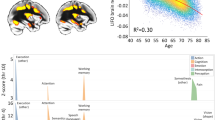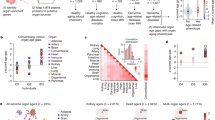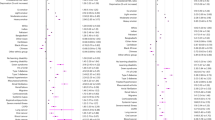Abstract
Hypertension is a major risk factor for dementia. Yet, the most suitable cognitive screening test for hypertensive patients has yet to be identified. This study investigated cognitive impairment in hypertensive older adults and compared the discriminative ability of the most widely used cognitive screening tests. The study involved hypertensive patients aged 65+ without prior diagnosis of cognitive impairment, from the Hypertension Clinic of Careggi Hospital, Florence, Italy. Mini Mental State Examination (MMSE), Montreal Cognitive Assessment (MoCA), MiniCog and Clock Drawing Test (CDT) were administered, using a comprehensive neuropsychological assessment as gold standard. The ROC curve analysis and the paired chi-square test were used to compare the discriminative ability, sensitivity and specificity for cognitive impairment of the different screening instruments. Cognitive impairment was diagnosed in 37% of 94 participants (mean age 76, 55% female), mainly involving attention and executive functions. The MoCA (AUC = 0.746), the MMSE (AUC = 0.689) and the MiniCog (AUC = 0.684) showed similar ability in detecting cognitive impairment, while the CDT had a poorer discriminative capacity (AUC = 0.535). The sensitivity of MoCA (80%) and of MMSE/MiniCog combination (74%) was higher in comparison with MiniCog alone (49%, p = 0.007 and 0.004, respectively), while MiniCog achieved the highest specificity (88%, p < 0.001 vs all). Cognitive impairment was detected in more than one-third of hypertensive older adults without prior diagnosis of dementia. MoCA, MMSE and MiniCog showed similar discriminative ability for cognitive impairment, with MoCa and MMSE showing greater sensitivity and MiniCog the highest specificity.

This is a preview of subscription content, access via your institution
Access options
Subscribe to this journal
Receive 12 digital issues and online access to articles
$119.00 per year
only $9.92 per issue
Buy this article
- Purchase on Springer Link
- Instant access to full article PDF
Prices may be subject to local taxes which are calculated during checkout

Similar content being viewed by others
Data availability
The data that support the findings of this study are available from the corresponding author upon reasonable request.
References
Sörös P, Whitehead S, Spence JD, Hachinski V. Antihypertensive treatment can prevent stroke and cognitive decline. Nat Rev Neurol. 2013;9:174–8.
Forette F. The Prevention of Dementia With Antihypertensive Treatment<subtitle>New Evidence From the Systolic Hypertension in Europe (Syst-Eur) Study</subtitle>. Arch Intern Med. 2002;162:2046.
Perrotta M, Lembo G, Carnevale D. Hypertension and dementia: Epidemiological and experimental evidence revealing a detrimental relationship. Int J Mol Sci. 2016;17:347.
Whelton PK, Carey RM, Aronow WS, Casey DE, Collins KJ, Dennison Himmelfarb C, et al. 2017 ACC/AHA/AAPA/ABC/ACPM/AGS/APhA/ASH/ASPC/NMA/PCNA Guideline for the Prevention, Detection, Evaluation, and Management of High Blood Pressure in Adults: Executive Summary: A Report of the American College of Cardiology/American Heart Association Task F. Hypertens (Dallas, Tex 1979). 2018;71:1269–324.
Williams B, Mancia G, Spiering W, Rosei EA, Azizi M, Burnier M, et al. 2018 practice guidelines for the management of arterial hypertension of the European society of cardiology and the European society of hypertension ESC/ESH task force for the management of arterial hypertension. 2018 https://doi.org/10.1097/HJH.0000000000001961.
Mossello E, Pieraccioli M, Nesti N, Bulgaresi M, Lorenzi C, Caleri V, et al. Effects of low blood pressure in cognitively impaired elderly patients treated with antihypertensive drugs. JAMA Intern Med. 2015;175:578–85.
Liang Y, Fratiglioni L, Wang R, Santoni G, Welmer AK, Qiu C. Effects of biological age on the associations of blood pressure with cardiovascular and non-cardiovascular mortality in old age: A population-based study. Int J Cardiol. 2016;220:508–13.
Weidung B, Littbrand H, Nordström P, Carlberg B, Gustafson Y. The association between SBP and mortality risk differs with level of cognitive function in very old individuals. J Hypertens. 2016;34:745–52.
Folstein MF, Folstein SE, McHugh PR. “Mini-mental state”. J Psychiatr Res. 1975;12:189–98.
Mossello E, Boncinelli M. Mini-Mental State Examination: a 30-year story. Aging Clin Exp Res. 2006;18:271–3.
Nasreddine ZS, Phillips NA, Bédirian V, Charbonneau S, Whitehead V, Collin I, et al. The Montreal Cognitive Assessment, MoCA: A Brief Screening Tool For Mild Cognitive Impairment. J Am Geriatr Soc. 2005;53:695–9.
Dong YH, Lee WY, Basri NA, Collinson SL, Merchant RA, Venketasubramanian N, et al. The Montreal cognitive assessment is superior to the minimental state examination in detecting patients at higher risk of dementia. Int Psychogeriatr. 2012;24:1749–55.
Ismail Z, Rajji TK, Shulman KI. Brief cognitive screening instruments: An update. Int J Geriatr Psychiatry. 2010;25:111–20.
Trzepacz PT, Hochstetler H, Wang S, Walker B, Saykin AJ. Relationship between the Montreal Cognitive Assessment and Mini-mental State Examination for assessment of mild cognitive impairment in older adults. BMC Geriatr. 2015;15:1–9.
Popović IM, Šerić V, Demarin V. Mild cognitive impairment in symptomatic and asymptomatic cerebrovascular disease. J Neurol Sci. 2007;257:185–93.
Zhao J, Tang H, Sun J, Wang B, Chen S, Fu Y. Analysis of cognitive dysfunction with Silent Cerebral Infarction: A prospective study in Chinese patients. Metab Brain Dis. 2012;27:17–22.
McLennan SN, Mathias JL, Brennan LC, Stewart S. Validity of the Montreal Cognitive Assessment (MoCA) as a screening test for Mild Cognitive Impairment (MCI) in a cardiovascular population. J Geriatr Psychiatry Neurol. 2011;24:33–38.
Shulman KI, Pushkar Gold D, Cohen CA, Zucchero CA. Clock-drawing and dementia in the community: A longitudinal study. Int J Geriatr Psychiatry. 1993;8:487–96.
Patnode CD, Perdue LA, Rossom RC, Rushkin MC, Redmond N, Thomas RG, et al. Screening for cognitive impairment in older adults. JAMA. 2020;323:764.
Qin J, He Z, Wu L, Wang W, Lin Q, Lin Y, et al. Prevalence of mild cognitive impairment in patients with hypertension: a systematic review and meta-analysis. Hypertens Res. 2021;44:1251–60.
Lazo-Porras M, Pesantes MA, Miranda JJ, Bernabe-Ortiz A. Evaluation of cognitive impairment in elderly population with hypertension from a low-resource setting: Agreement and bias between screening tools. eNeurologicalSci. 2016;5:35–40.
Vicario A, Cerezo GH, del Sueldo M, Zilberman J, Pawluk SM, Lódolo N, et al. Neurocognitive disorder in hypertensive patients. Heart–Brain Study. Hipertens y Riesgo Vasc. 2018;35:169–76.
Moraes NC, Muela HCS, Memória CM, da Costa-Hong VA, Machado MF, Cechinhi MA, et al. Systemic arterial hypertension and cognition in adults: Effects on executive functioning. Arq Neuropsiquiatr. 2020;78:412–8.
Magni E, Binetti G, Bianchetti A, Rozzini R, Trabucchi M. Mini-mental state examination: A normative study in Italian elderly population. Eur J Neurol. 1996;3:198–202.
Borson S, Scanlan JM, Chen P, Ganguli M. The Mini-Cog as a screen for dementia: Validation in a population-based sample. J Am Geriatr Soc. 2003;51:1451–4.
Carlesimo GA, Caltagirone C, Gainotti G, Fadda L, Gallassi R, Lorusso S, et al. The mental deterioration battery: Normative data, diagnostic reliability and qualitative analyses of cognitive impairment. Eur Neurol. 1996;36:378–84.
Youn JC, Kim KW, Lee DY, Jhoo JH, Lee SB, Park JH, et al. Development of the subjective memory complaints questionnaire. Dement Geriatr Cogn Disord. 2009;27:310–7.
Pajewski NM, Berlowitz DR, Bress AP, Callahan KE, Cheung AK, Fine LJ, et al. Intensive vs standard blood pressure control in adults 80 years or older: A secondary analysis of the systolic blood pressure intervention trial. J Am Geriatr Soc. 2020;68:496–504.
Roalf DR, Moberg PJ, Xie SX, Wolk DA, Moelter ST, Arnold SE. Comparative accuracies of two common screening instruments for classification of Alzheimer’s disease, mild cognitive impairment, and healthy aging. Alzheimer’s Dement. 2013;9:529–37.
Ciesielska N, Sokołowski R, Mazur E, Podhorecka M, Polak-Szabela A, Kędziora-Kornatowska K. Is the Montreal Cognitive Assessment (MoCA) test better suited than the Mini-Mental State Examination (MMSE) in mild cognitive impairment (MCI) detection among people aged over 60? Meta-analysis. Psychiatr Pol. 2016;50:1039–52.
Nazem S, Siderowf AD, Duda JE, Ten Have T, Colcher A, Horn SS, et al. Montreal cognitive assessment performance in patients with Parkinson’s Disease with “normal” global cognition according to mini-mental state examination score. J Am Geriatr Soc. 2009;57:304–8.
Burton L, Tyson S. Screening for cognitive impairment after stroke: A systematic review of psychometric properties and clinical utility. J Rehabil Med. 2015;47:193–203.
Iadecola C, Gottesman RF. Neurovascular and cognitive dysfunction in hypertension. Circ Res. 2019;124:1025–44.
Hosmer DW, Lemeshow S, Sturdivant RX. Applied Logistic Regression. Wiley, 2013 https://doi.org/10.1002/9781118548387.
Borson S, Scanlan JM, Watanabe J, Tu SP, Lessig M. Simplifying detection of cognitive impairment: Comparison of the Mini-Cog and Mini-Mental State examination in a multiethnic sample. J Am Geriatr Soc. 2005;53:871–4.
Yang L, Yan J, Jin X, Jin Y, Yu W, Xu S, et al. Estimation of diagnostic performance of dementia screening tests: Mini-Mental State Examination, Mini-Cog, Clock Drawing test and Ascertain Dementia 8 questionnaire. Aging Ment Health. 2018;22:948–52.
Ravaglia G, Forti P, Maioli F, Servadei L, Martelli M, Brunetti N, et al. Screening for mild cognitive impairment in elderly ambulatory patients with cognitive complaints. Aging Clin Exp Res. 2005;17:374–9.
Heizhati M, Wang L, Li N, Li M, Pan F, Yang Z, et al. Prevalence of mild cognitive impairment is higher in hypertensive population: a cross-sectional study in less developed northwest China. Med (Baltim). 2020;99:e19891.
Author information
Authors and Affiliations
Contributions
Study concept and design: GR, EM, and AU. Acquisition of data: all authors. Analysis and interpretation of data: GR, MB, FS, GC, DF, EM, and AU. Drafting of the manuscript: GR, EM, and AU. Critical revision of the manuscript for important intellectual content: all authors. Final approval of the version to be published: all authors. Agreement to be accountable for all aspects of the work: all authors.
Corresponding author
Ethics declarations
Competing interests
The authors declare no competing interests.
Ethical approval
The study was approved by the Local Ethic Committee (protocol number 16174_oss). All participants gave their informed consent to participate.
Additional information
Publisher’s note Springer Nature remains neutral with regard to jurisdictional claims in published maps and institutional affiliations.
Supplementary information
Rights and permissions
Springer Nature or its licensor (e.g. a society or other partner) holds exclusive rights to this article under a publishing agreement with the author(s) or other rightsholder(s); author self-archiving of the accepted manuscript version of this article is solely governed by the terms of such publishing agreement and applicable law.
About this article
Cite this article
Rivasi, G., D’Andria, M.F., Bulgaresi, M. et al. Screening for cognitive impairment in older adults with hypertension: the HYPER-COG study. J Hum Hypertens 37, 1000–1006 (2023). https://doi.org/10.1038/s41371-023-00817-x
Received:
Revised:
Accepted:
Published:
Issue Date:
DOI: https://doi.org/10.1038/s41371-023-00817-x



